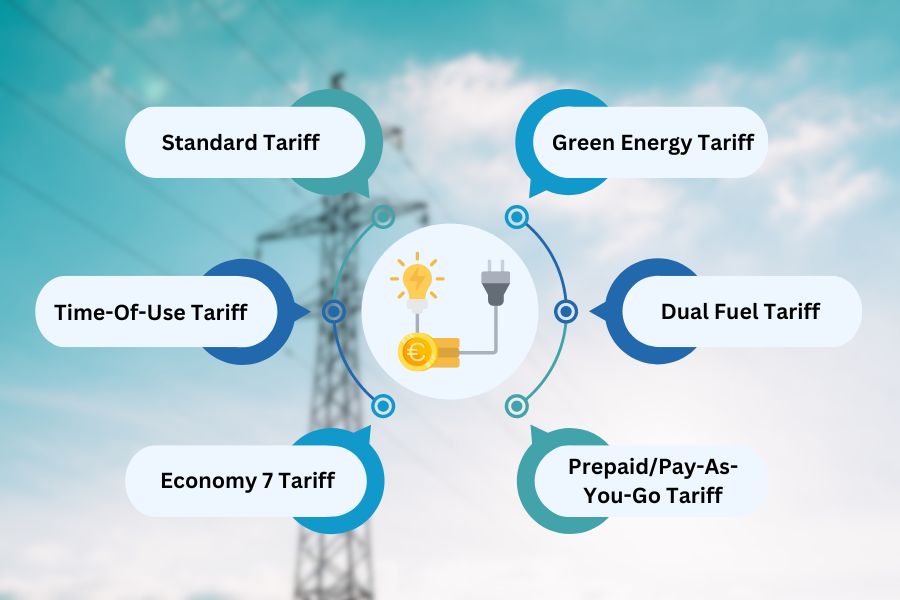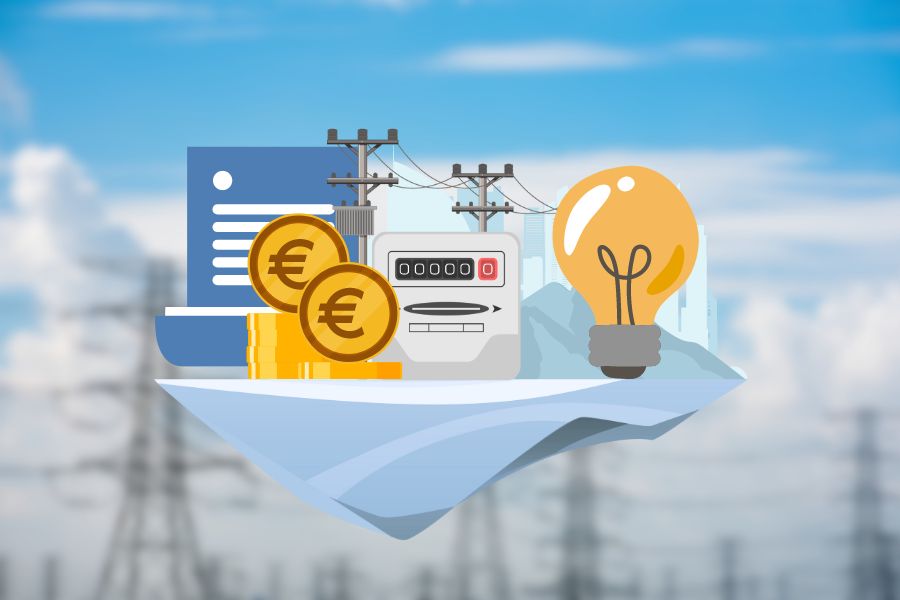Understanding the unit cost of electricity in Ireland requires more than a flat rate per kilowatt-hour (kWh). With Electric Ireland charging a rate of 43.27 cents per kWh, plus an additional Standing Charge of €302.91, it’s evident that various factors contribute to your final price.
The mix of electricity generation sources, global fuel prices, government policies, and weather conditions also influences costs.
Additionally, various tariff plans cater to different consumer needs and consumption patterns, from standard to time-of-use. Knowing these differentiating factors and pricing plans empowers Irish consumers to manage their energy costs effectively.
What Are the Current Electricity Rates in Ireland?
Electric Ireland currently charges a rate of 43.27 cents per kilowatt-hour (kWh) for electricity consumed. In addition to the energy usage charge, there is a Standing Charge of €302.91, including VAT.
Note that the VAT on electricity in Ireland is temporarily reduced from 13.5% to 9% until October 2023. This reduction aims to provide some relief to consumers by lowering the overall cost of electricity. However, keeping track of changes in VAT rates beyond this timeframe is crucial.
Note that the average price of electricity in Ireland can vary among suppliers and tariffs. Therefore, exploring multiple options and comparing rates is advisable before deciding.
How Is the Cost of Electricity Measured in Ireland?

The cost of electricity in Ireland is measured using a kilowatt-hour (kWh) unit. A kilowatt-hour represents the amount of electrical energy consumed when a device with a power rating of one kilowatt (1 kW) operates for one hour.
Electricity meters installed in households and businesses measure the electricity consumed in kilowatt-hours. The readings from these meters help to calculate the cost based on the applicable rate per kilowatt-hour set by the electricity supplier.
To determine the total cost of electricity, they multiply the kilowatt-hours consumed during a specific billing period by the unit rate. It includes any applicable taxes, charges, or standing fees. This calculation accurately represents the cost incurred for the electricity consumed in Ireland.
Factors Influencing the Electricity Price in Ireland
Generation Mix
The composition of electricity generation sources, such as fossil fuels, renewable energy, and imports, can affect prices. Renewable energy sources, like wind and solar, generally have lower operating costs, which can contribute to lower prices.
Fuel Prices
The cost of fuels used in electricity generation, such as natural gas and coal, can impact prices. Fluctuations in global fuel prices can influence electricity prices in Ireland.
Wholesale Electricity Market
The supply and demand dynamics in the wholesale market, where they trade electricity between generators and suppliers, can affect prices. Factors like the availability of generation capacity, demand levels, and market competition play a role.
Network Costs
They pass on costs associated with operating and maintaining the electricity transmission and distribution networks to consumers. Investments in network infrastructure and grid upgrades can impact prices.
Government Policies and Taxes
Government policies, regulations, and taxes that relate to energy and the environment can influence electricity prices. These may include carbon pricing, renewable energy support schemes such as grants for solar panels, and taxes on electricity consumption.
Exchange Rates
As Ireland imports a portion of its electricity, fluctuations in exchange rates can affect the cost of imported electricity and, consequently, the overall electricity price.
Weather Conditions
Weather conditions, particularly wind and rainfall, can impact the availability of renewable energy sources like wind and hydroelectric power. Variations in weather patterns can affect electricity generation and prices.
Interconnection Capacity
The capacity and availability of interconnectors between Ireland and other countries can influence electricity prices. Increased interconnection capacity allows for more efficient electricity trading and access to lower-priced electricity from neighboring markets.
Note that these factors can interact, and their impact on electricity prices may vary.
Are There Different Electricity Pricing Plans Available in Ireland?

Yes, there are different electricity pricing plans available in Ireland. Electricity suppliers offer various plans to suit the needs and preferences of consumers. Some common pricing plans include:
- Standard Tariff: This is the default plan offered by electricity suppliers. It usually has a fixed unit rate for electricity consumption and may have additional charges, such as standing charges or taxes.
- Time-Of-Use Tariff: This plan charges different rates for electricity consumption based on the time of day. It typically has higher and lower rates during peak hours during off-peak hours. This plan encourages customers to shift their electricity usage to off-peak times when demand is lower.
- Economy 7 Tariff: This plan is specifically for customers with electric storage heaters or immersion heaters. It provides lower rates for electricity usage during the night (typically seven hours) and higher rates during the day.
- Green Energy Tariff: This plan offers electricity generated from renewable energy sources. It allows customers to support clean energy generation and reduce their carbon footprint.
- Dual Fuel Tariff: Some suppliers offer combined electricity and gas plans for customers who use both energy sources. These plans may provide discounts or incentives for bundling electricity and gas services.
- Prepaid/Pay-As-You-Go Tariff: This plan allows customers to pay for electricity in advance, typically using a prepaid card or a smart meter. It provides more control over electricity costs and can be suitable for budgeting purposes.
How Can I Find Out the Specific Unit Cost of Electricity in Ireland?

Visit the websites of different electricity suppliers and navigate to their residential or domestic pricing sections. Look for information on unit costs or rates per kilowatt-hour (kWh).
Reach out to the electricity suppliers directly through their customer service helpline or email to inquire about their current unit costs for electricity. Do not forget to ask about any applicable standing charges, taxes, or discounts that may affect the overall cost.
Comparing the pricing plans different suppliers offer is crucial to determine which one suits your needs best and find the cheapest electricity prices. Consider factors such as the unit cost, standing charges, contract terms, and any additional benefits or incentives that may be available.
Utilize online energy comparison tools, which provide a convenient way to compare electricity prices from multiple suppliers. These platforms allow you to enter user details and preferences to receive personalized results with estimated annual bills.
For additional information on electricity pricing, regulatory updates, and consumer guidelines, consult the website or resources provided by the Commission for Regulation of Utilities (CRU) in Ireland.
By following these steps, you can gather comprehensive information on the specific unit cost of electricity in Ireland. Compare pricing plans, and make an informed decision to manage your energy costs effectively.
Frequently Asked Questions
Are There Any Additional Charges or Taxes on Electricity Bills in Ireland?
Yes, electricity bills in Ireland may include additional charges such as standing charges, taxes (including VAT), and levies for renewable energy support.
Are Ireland’s Electricity Prices the Most Expensive in Europe?
Ireland does not have the most expensive electricity prices in Europe, but they are higher than the European average due to factors like energy generation costs and network infrastructure.
Why Compare Energy Suppliers and Prices?
Comparing energy suppliers and prices helps consumers find the best deals, lower their energy costs, and potentially access additional benefits or incentives.
What Is a Dual Fuel Plan?
A dual fuel plan combines electricity and gas services from a single supplier, often providing convenience and potential cost savings through bundled offerings.
Have Electricity Prices Led to Supplier Collapses in Ireland?
Electricity prices have not directly caused supplier collapses in Ireland, but some market dynamics and regulatory factors have contributed to the challenges faced by some suppliers.
How to Switch Your Energy Supplier
Switching your energy supplier involves:
- contacting your desired supplier
- providing relevant information
- completing the necessary paperwork or online process to transition to a new provider
How Else Can I Cut My Energy Bills?
Cutting energy bills can be achieved by adopting energy-saving practices, improving insulation, using energy-efficient appliances, and exploring renewable energy options such as solar panels or wind turbines.
Conclusion
Determining the unit cost of electricity in Ireland is essential for you as a consumer seeking to manage your energy expenses effectively.
You can make informed decisions about your electricity consumption by considering energy efficiency, average prices, estimated annual bills, and potential cost-saving measures.
Whether it’s through comparing prices, adopting energy-efficient practices, or exploring renewable energy options, you can control your energy usage, reduce your estimated annual bill, and save money.
Understanding the unit cost of electricity empowers you to make intelligent choices, optimize your energy consumption, and contribute to a sustainable and cost-effective future.
